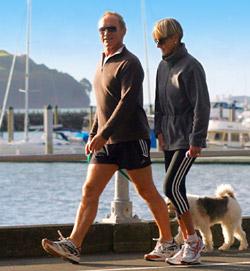If you're middle-aged and admittedly someone who usually walks slowly, here's something to consider as you stroll, as well as some preventative action you may want to take.
That advice for intervention stems from a new, large observational study that discovered an association between slow-walking adults and "all-cause and cardiovascular mortality within the general population."
Research using data derived from over 420,000 middle-aged adults in the United Kingdom found that those identifying themselves as "slow walkers" were nearly twice as likely to die from a heart-related cause as compared to those who walked quickly. This finding emerged after researchers ruled out key confounders, such as tobacco use and sedentary behavior.
"Slow walkers were around twice as likely to have a heart-related death compared to brisk walkers," states Prof. Tom Yates from the University of Leicester, the study's principal investigator. "This finding was seen in both men and women and was not explained by related risk factors such as smoking, body mass index, diet or how much television the participants in the sample watched. This suggests habitual walking pace is an independent predictor of heart-related death."
Subjects' data was collected from over 500,000 middle-aged adults throughout England, Scotland, and Wales in the five-year period between March 2006 and July 2010, with a six-minute "submaximal fitness test" administered where heart rates were monitored. The participant pool was subsequently reduced to 420,727 people who had no signs of heart disease or cancer at the time data was gathered. The age range of participants was 39 to 74 years, while the mean age was 56.4 years.
Of those, nearly 8,600 died in the following six-plus years, with 4,850 succumbing to cancer and 1,654 others to cardiovascular disease, with males outpacing females.
"The number of all-cause, cancer, and cardiovascular deaths was greater in men (5184, 2682, and 1188, respectively) than women (3414, 2168, and 466 respectively)," the authors wrote in their paper, announced today and published last week in the European Health Journal.
While a slow gait, of course, did not represent a direct link to heart-related death, these researchers noted that it might be an indicator of other physical weaknesses – which could be addressed by a physician.
For instance, someone who sees them self as a slow walker might raise that belief during a visit to their doctor, who, in turn, could provide a quick screening test to identify risk. Or conversely, this study could prompt doctors to inquire about a patient's walking speed, and if necessary administer cardiac screening or simple, no-cost tests of physical strength as a preventative measure. Based on walking speed alone, just asking more direct questions could prove beneficial.
"We also found that self-reported walking pace was strongly linked to an individual's objectively measured exercise tolerance, further suggesting walking pace is a good measure of overall physical fitness," added Prof. Yates. "Therefore, self-reported walking pace could be used to identify individuals who have low physical fitness and high mortality risk that would benefit from targeted physical exercise interventions."
In this study researchers also set out to assess hand grip strength to see whether it was predictive in determining the risk of cancer or heart-related death. However, the association was inconsistent; "Compared with self-reported walking pace," the authors wrote, "handgrip strength appeared to be a less generalizable marker of risk within the general population."
While the study does not present alarmist cause-and-effect findings indicating that slow walkers are at risk, the observations do have the potential to have merit, worthy of doctor-patient discussion.




